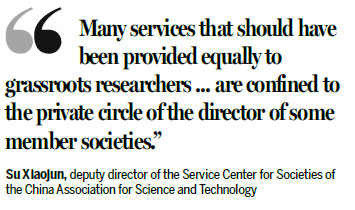Plan calls for better coordination to benefit researchers and general public
The China Association for Science and Technology, an association covering more than 70 million researchers, is starting a new round of systematic reform to overcome a bureaucracy that isolates the organization from the masses.
The move comes after the General Office of the Communist Party of China Central Committee issued a plan for deepening reforms in science and technology associations nationwide on Sunday.
Science and technology associations in China should better serve science workers, and the national strategy of innovation-driven development, as well as the government and the general public through reforms, the document said.
The document called on those associations to build closer links with science workers and the general public, and also called for better management of societies and administrative organs under the associations.
The plan proposes to recruit science and technology associations in major enterprises and universities as group members of the China Association for Science and Technology, and encouraged societies of related disciplines to form coalitions as a way of sharing information and resources among the members.
"Many services that should have been provided equally to grassroots researchers, such as academic exchanges and publication of academic papers, are confined to the private circle of the director of some member societies," said Su Xiaojun, deputy director of the Service Center for Societies of the association.
"Although this phenomenon exists only in a minority of the member societies, it will affect the connection between researchers and the government. So we have to overcome this issue through the reform," he said.
With 207 member societies covering the gamut of natural sciences, the association is the largest national nongovernmental organization of scientific and technological workers in China, which serves as a bridge between government and the science community.
"I hope that CAST will make full use of its member societies to lead China's science community into the new frontier of innovation," said Fu Yuwu, president of the Society of Automotive Engineers of China.
The society has established four technological alliances that include the whole industry chain of electric cars.
"From automobile manufacturer to information technology, Internet companies, metallurgical industry and composite material and carbon fiber producers, we have a unique strength in building a large platform that is impossible for other organizations," Fu said.
Yu Xiaohu, general secretary of the China Ordnance Society, said CAST also has an advantage in providing consulting services.
"CAST has eight member societies that cover almost every aspect related to the country's national defense system and have strong technical strength," Yu said.
Yu said CAST should provide in-depth consultation to decision-makers, build a cooperation platform and enhance technology transfer in the process of civil-military integration.
As part of the recent Chinese government efforts to streamline administration and delegate power, CAST will also take over some government functions.
"The association will shoulder more responsibilities assessing scientific projects and national laboratories, certifying professional credentials, recommending candidates for national sci-tech awards and developing industry standards," said the service center's Su.
Xinhua contributed to this story.

